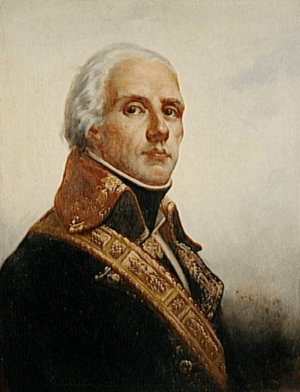Jacques François Dugommier facts for kids
Quick facts for kids
Jacques François Dugommier
|
|
|---|---|

General Dugommier, portrait by François Bouchot (1836)
|
|
| Born | 1 August 1738 Trois-Rivières, Kingdom of France |
| Died | 18 November 1794 (aged 56) Pont de Molins, Spain |
| Allegiance | |
| Years of service | 1750–1794 |
| Rank | Divisional general |
| Commands held | Armée des Pyrénées orientales |
| Battles/wars | Seven Years' War
|
| Awards | Order of Saint Louis Names inscribed under the Arc de Triomphe |
Jacques François Coquille, also known as Dugommier, was a brave French general. He was born on August 1, 1738, in Trois-Rivières, Guadeloupe. He sadly died on November 18, 1794, during the Battle of the Black Mountain.
Contents
The Life of General Dugommier
Early Years and Military Start
Jacques François Dugommier was born in Trois-Rivières, Guadeloupe, on August 1, 1738. He began his military career in 1759. He fought to defend Guadeloupe, though it was not successful. He also fought in Martinique during the Seven Years' War. In 1785, he started using the name Dugommier. Later, he joined the side of the Revolutionaries.
Commander in the Italian Army
In September 1793, Dugommier led his troops to push back the armies of the Habsburg monarchy and the Kingdom of Sardinia from Nice. He defeated the Austrian forces led by Joseph De Vins near the city of Gilette.
While serving as a representative in the French government, Dugommier took over as commander of the army. This army was surrounding the city of Toulon. He saw that a young artillery major named Napoleon Bonaparte had a very good plan for attack. Dugommier decided to follow Napoleon's plan.
In December 1793, Dugommier successfully ended the Siege of Toulon. After this victory, Napoleon himself said that "General Dugommier fought with true republican courage."
Campaign in the Pyrenees
In January 1794, Dugommier was put in charge of the Army of the Eastern Pyrenees. His main goal was to take back the area of Roussillon from the Spanish army. This army was led by Antonio Ricardos Carrillo.
Dugommier worked hard to reorganize his army. It had become weak from many difficult battles the year before. His job became easier when the Spanish army faced problems with their leaders. Two of their commanders died from illness.
On April 28, Dugommier won the Battle of Tech. This was followed by another success at the Battle of Albere on April 30. He then achieved a very important victory at the Battle of Boulou on May 1. After this defeat, the Spanish commander, Luis Firmin de Carvajal, had to retreat.
The Spanish also left Port-Vendres in May. Collioure fell to Dugommier's forces after a four-week siege on May 26. On August 13, he stopped a Spanish attack in the Battle of San-Lorenzo de la Muga. He then took back Fort de Bellegarde on September 17, 1794, after a long siege. On September 22, a bold attack helped him capture the enemy's camp at Costouge. This made the enemy flee and allowed his army to capture most of their equipment.
His Final Battle and Legacy
General Dugommier was killed by Spanish cannon fire on November 18, 1794. This happened during the Battle of the Black Mountain. He was buried in Perpignan, where a pyramid-shaped monument marks his resting place. Napoleon always remembered Dugommier's bravery. He later gave 100,000 Francs to Dugommier's son to honor his father's role in the Battle of Toulon.
Dugommier's name is honored in several ways:
- His name is written in the Panthéon in Paris.
- A street in Marseille is named the Boulevard Dugommier.
- A station on the Paris Metro subway system is named Dugommier.
See also
 In Spanish: Jacques Dugommier para niños
In Spanish: Jacques Dugommier para niños
- Jacques Dugommier (in Spanish)
 | George Robert Carruthers |
 | Patricia Bath |
 | Jan Ernst Matzeliger |
 | Alexander Miles |

